
20 August 2025
The City of Cape Town announced that it wrote in March to the the social development minister requesting financial support for its Dial-a-Ride disability transport service. But the department says it has received no such request. Archive photo: Will Yoder
Last week, the City of Cape Town made public that it had sent a letter in March and a follow-up one in May to Minister of Social Development Nokuzola Sisisi Tolashe to request financial support for Dial-a-Ride, its dedicated kerb-to-kerb service for people with disabilities.
The City said it received no reply, but the national Department of Social Development (DSD) told GroundUp it has received no such letter.
We reported last week that Dial-a-Ride (DAR) would only be available for wheelchair users and people with severe walking impairments from 8 September. Those with visual and cognitive impairments, elderly people, and organisations using the service, would no longer be accommodated. The City said this was due to budget constraints.
The annual budget for Dial-a-Ride is about R28-million; but the operating costs have been up to R40-million. “The current budget deficit amounts to nearly R1-million a month, and the operational costs will continue to increase,” a City statement said.
The letter, which the City says was signed off by mayco member for urban mobility Rob Quintas and sent to DSD, states: “Given that this involves both transport and social services components, I am hopeful that the Ministry will agree that it aligns with Social Development’s core mandate.”
But the DSD media department told GroundUp: “Minister Nokuzola Tolashe has not received a letter from the City of Cape Town. It is also a great opportunity to indicate that protocols of government dictate that the request should be sent to Treasury through the right channels and this is known by the City of Cape Town.”
Meanwhile, the Western Cape Network on Disability (WCND) has raised concerns over the “lack of transparency”. In a statement released on Monday, it said Quintas stated there were multiple engagements with disability advocacy organisations. “Which organisations were consulted? To our knowledge, none of our many member organisations, which represent a broad spectrum of disabilities, were included.”
“We must stress that notification is not consultation, and sending out hard copy letters that many disabled people cannot even access (particularly since one of the groups entirely excluded from the service are blind) is not acceptable.”
Dial-a-Ride currently averages 4,500 monthly passenger trips with about 2,200 users. More than 460 users are currently on its waiting list. They require access to the Dial-A-Ride in order to travel to work, seek medical attention, collect money, access services, amenities and employment opportunities.